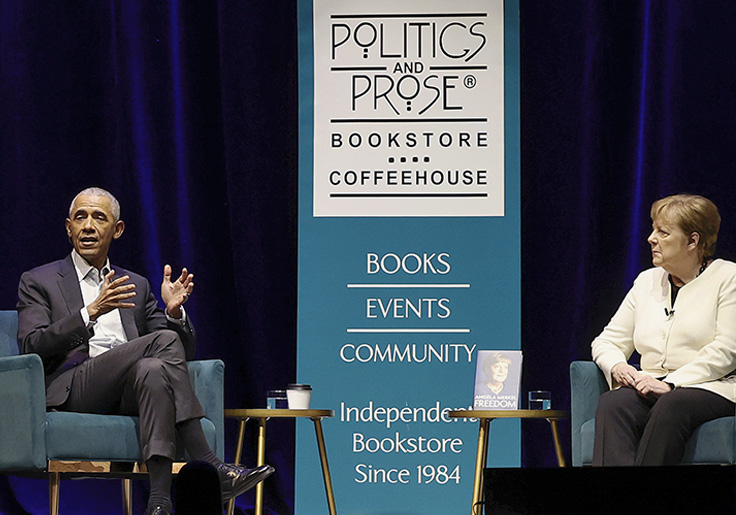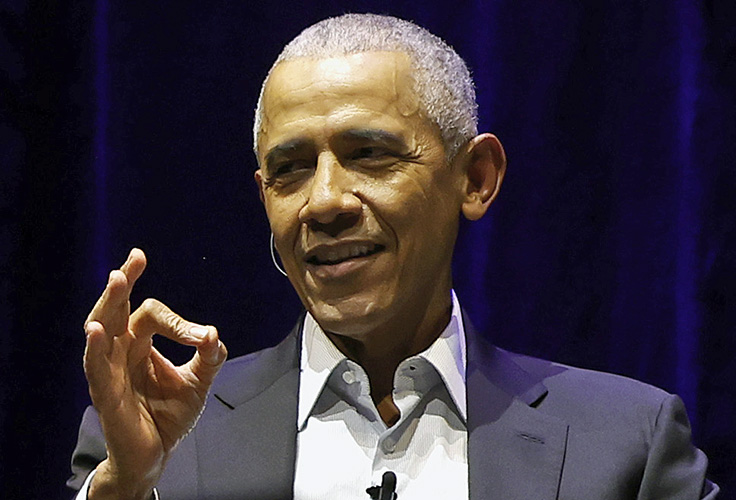If they weren't expressing solidarity with terrorists, one could almost feel sorry for the anti-Israel protesters shivering in the cold outside the Anthem music hall in Washington, D.C., where thousands of liberal elites and a Washington Free Beacon journalist have lined up to watch Barack Obama, the multimillionaire Netflix producer, and Angela Merkel, the former German chancellor, congratulate themselves on making the world a better place.
Obama, who still elicits schoolgirl squeals from the (predominately white) audience of Harry Potter professionals, overpaid bureaucrats, and Europeans, is technically here to "interview" Merkel about her new book, Freedom: Memoirs 1954-2021. He is exceptionally ill-suited for the task, given his fondness for listening to himself talk about his favorite subject: himself. "Congratulations on finishing the book," Obama tells Merkel during his introduction. "I've finished a couple of books. I've got one that I haven't finished, and it's a terrible feeling. People ask me sometimes, do you like writing? I say, no, I like having written." He's referring, of course, to the second volume of his post-White House memoir. Volume one, A Promised Land, came out in 2020 and was relatively concise (for Obama) at just 768 pages.
Eventually the former president gets around to asking Merkel questions about her life, which is quite interesting on paper: born in West Germany, raised in East Germany, entered politics shortly after the fall of the Berlin Wall. She answers in German, which must be thrilling for the American liberals in the audience, who get to listen to a translator through a crappy earpiece and playact as sophisticated participants at some fancy international conference. The substance of her answers are also very German in the sense that no matter the subject, she always sounds (via translation) like she is reciting an instruction manual from memory. Alas, her American counterpart is only marginally more charismatic, his outsized reputation notwithstanding.
 (Kevin Dietsch/Getty Images)
(Kevin Dietsch/Getty Images)Obama attempts, with characteristic arrogance, to draw a parallel between the division of Germany during the Cold War and the "kinds of divides we're now dealing with" in the United States, specifically as they relate to "urban and rural communities," which have "different cultures" and "different values" that can be "exploited politically." If Germany can unite after the fall of communism, he says, perhaps the United States can also unite someday. It's not entirely clear what he's talking about. The 2024 election results suggest the country has become less divided along geographic lines, as Donald Trump significantly increased his share of the vote in urban counties compared with 2020. It's possible, or even likely, that Obama is implying that every American who voted for Trump has been politically exploited in some fashion. Bless their hearts, the bitter rubes who "cling" to things "to explain their frustrations."
The extreme self-confidence with which Obama, of all people, claims to know how to cure America's political divisions is nothing short of astonishing. When Merkel suggests that politicians should maintain a healthy "curiosity" about the people with whom they disagree, the former president weighs in by talking about himself. "The first big speech I gave to a national audience talked about the United States of America," he says. "This is something when I'm talking to younger leaders, whether in the United States or around the world, I often discuss. I really like that word you use, 'curiosity,' being able to listen actively and be curious about and learn from the experiences of those who are not exactly like you. And people can tell if you are really listening to them or you just see them as some objects." Bold words from the (alleged) once-in-a-generation political talent whose most memorable contribution to the 2024 election was lecturing black men, a.k.a. "tha brothas," about misogyny.
About halfway through the 90-minute conversation, Merkel decides she needs a breather and invites Obama to talk about his political journey. Invitation accepted. "No, it's interesting, I mean, I've written about this, but I'm not here to sell my book," he quips. Obama rambles on for several minutes about being inspired by Gandhi and Nelson Mandela and the heroes of the Civil Rights Movement and blah blah blah until he started to consider politics as "one possible means" of using his intellectual gifts to make the world a better place. "And it turned out I was pretty good at it," he explained. Obama appears to take note of the time and attempts to steer the conversation back on topic (sort of) by talking about his (ridiculous, in retrospect) campaign rally in Berlin as a 2008 presidential candidate. "I wasn't sure anyone was going to show, but 250,000 people came, so it went fine," he boasts. The former president goes on to mansplain the financial crisis—"We won't give an economics lesson here, but…"—as well as the history of hyperinflation in Germany.
Riveting stuff. Eventually both leaders agree they did a fantastic job saving the world from economic collapse. They also compliment each other for being so smart and lovely to work with. There is no time, obviously, to assess the current state of the world and reflect on their respective roles in bringing us to this point. Following a brief exchange about the widespread populist backlash to relaxed immigration policies in the United States and Europe, Obama and Merkel agree that racism is bad. At this point, more than an hour and 15 minutes in, at least one audience member is pining for some kind of disruption from a Hamas sympathizer who shelled out hundreds of dollars to get thrown out after making a scene. When it finally happens, the obnoxious protester's nasally whine is barely audible. "People came to listen to Angela and not you, young lady," Obama scolds as security swarms. "You can organize your own event and people can come to listen to you and your question."
One could almost feel sorry for the scolded young lady, but she didn't even have to stand outside in the cold. If anyone deserves some sympathy, or at least a healthy curiosity regarding their niche worldview, it's the thousands of liberal elites who flocked here this evening, seemingly under the impression that Barack Obama and Angela Merkel still have anything insightful to say about the strange new world they helped create.
 (Kevin Dietsch/Getty Images)
(Kevin Dietsch/Getty Images)Source link

